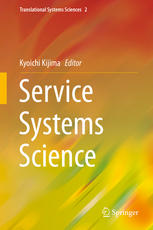

Most ebook files are in PDF format, so you can easily read them using various software such as Foxit Reader or directly on the Google Chrome browser.
Some ebook files are released by publishers in other formats such as .awz, .mobi, .epub, .fb2, etc. You may need to install specific software to read these formats on mobile/PC, such as Calibre.
Please read the tutorial at this link: https://ebookbell.com/faq
We offer FREE conversion to the popular formats you request; however, this may take some time. Therefore, right after payment, please email us, and we will try to provide the service as quickly as possible.
For some exceptional file formats or broken links (if any), please refrain from opening any disputes. Instead, email us first, and we will try to assist within a maximum of 6 hours.
EbookBell Team

4.4
92 reviewsThe present volume illustrates a rich and promising research field in service,service systems sciences,by combining and fusing two strands of sciences: the science of service systems and systems sciences of service.The scale, complexity, and interdependence of today’s service systems have been driven to an unprecedented level by globalization, demographic changes, and technology developments, so that it is absolutely necessary now for us to cultivate a new frontier of service research.
In response, service science has emerged during the past decade as a transdisciplinary research field that aims to clarify, analyze, and design the structure and process of service systems. Service science is strongly motivated to prove the science of service systems. To deal with complexity, interactions, and the network of, in, and among service systems, we need to take a more systemic view. Because systems sciences offers a way of thinking in relationships and interaction and theories and models to address complexity, it is legitimate to develop systems sciences of service by explicitly focusing on systemic properties of service and service systems.
As a volume of the Translational Systems Sciences series, this book emphasizes, in particular, a translational systems sciences perspective when the authors are approaching service, service systems, and service innovation. Indeed, the book employs systems sciences as a common framework or language not only to approach service in a holistic way but also to take a translational approach aiming to explain, analyze, design, and support service systems and their evolution.